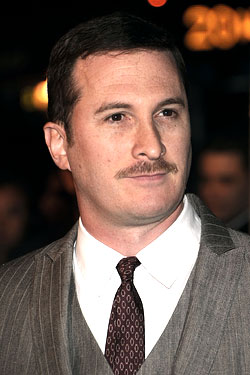
Brooklyn’s own Darren Aronofsky spent the eighties listening to hip-hop and being a whiz kid at school, so it’s probably a bit strange to see him making a movie about a has-been pro wrestler who still fights to the strains of forgotten metal heroes like Accept and Cinderella. Aronofsky burst onto the indie scene with 1998’s ultra-low-budget Pi and then catapulted onto the A-list with 2000’s Oscar-nominated addiction drama Requiem for a Dream; But with his latest film, The Wrestler, which opens today, Aronofsky appears to be ready to recharge his batteries, having dispensed with his regular crew and working on a relatively tiny budget. And with said budget, Aronofsky won the Golden Lion at Venice and resurrected troubled lead Mickey Rourke’s career along the way. The director sat down with Vulture to talk about his latest, the reception to his 2006 sci-fi epic The Fountain, and about how a Ratt song can enhance the emotional texture of a bar scene.
I think a lot of people will be surprised by how restrained your style is in this film.
I took on this film because I very consciously wanted to do something different. I feel like Pi, Requiem for a Dream, and The Fountain are all kind of connected in some way — they’re almost a trilogy. And I wanted to reinvent myself. So this was a radical departure for me. My partner, Rachel Weisz, is an actor, and I loved the idea of just getting in there and being able to work in that space between actors, to really make a film that fed off on that interaction between actors. I also wanted to go back to shooting documentary style, which was how I originally started filmmaking.
You realize, of course, that people will say that you’re just regrouping after the failure of The Fountain.
[Laughs] Well, you know, I couldn’t be happier with The Fountain. It’s the film I wanted to make, and I think if you get it, you get it, and if you don’t, you don’t. People seem to think that movie was universally panned, but if you go back and look at what was actually said, you’ll see that that’s not the case. I was talking with Hugh Jackman the other day, and he said that he still gets approached by more people about The Fountain than about any other film he’s made. There are a lot of people out there who really love that movie.
Did people warn you about working with Mickey Rourke?
Financiers certainly did. We couldn’t get the film financed with Mickey in it. Everybody thought we were crazy. Nobody thought that he could be sympathetic in the role. Which is ridiculous when you see the film. You just have to look into his eyes and there’s just something incredible there. And Mickey was great to work with — you have to push his buttons certainly, and he’s a challenging actor. But that’s what I wanted to do anyway. This movie is Mickey. It’s hard to imagine anyone else doing this part.
Did you improvise along the way?
Mickey and I sat down with the script beforehand and went through it line by line, and I let him change things that worked or didn’t work for him. But we definitely worked from a script. There is a lot of stuff there where we just got in there and shot what we could. The scenes with Mickey behind the deli counter — that’s a real deli counter. A lot of those are real customers. That’s him just interacting with people. We didn’t have the budget to plan and program everything perfectly. For a lot of the wrestling scenes, we were at real matches.
What’s the hardest cut you’ve ever had to make?
The hardest was while making this movie, actually. We had a scene near the end with Mickey in front of the mirror, where he’s talking and he just went to some incredibly deep, dark place. Seriously, it was possibly the finest piece of acting I’ve ever seen in my life. It was absolutely intense. And I had to cut it. It would have totally upset the balance of the film — it was that powerful. It was heartbreaking.
I was impressed with the music in the film. Yes, you’ve got a Springsteen song and you’ve got “Sweet Child O’ Mine,” but you’ve also got Ratt and Accept — these are kind of like the loser bands of eighties metal.
Well, let’s just say that those are the rewards of not really having a music budget. [Laughs] The original script had these bigger songs in it, but there was no way we could afford them. In fact, in the bar scene where Marisa and Mickey bond over Ratt’s “Round and Round,” Mickey really wanted it to be Guns ‘N Roses. He hates hair metal. And I knew there was no way we could get “Sweet Child O’ Mine.” Mickey said, “I’m friends with Axl, I’m friends with Axl!” And he was on the phone every day leaving messages for Axl to let us have the song. Finally, we just had to shoot it, and Axl came through at the last minute, let us have it for a fraction of the amount they would have ordinarily charged. But I decided I couldn’t change it. I had to go to Mickey and tell him that. He was furious. But it wouldn’t have worked — two people connecting over “Sweet Child O’ Mine” isn’t anything special. Two people connecting over Ratt — that’s so much more unique.





